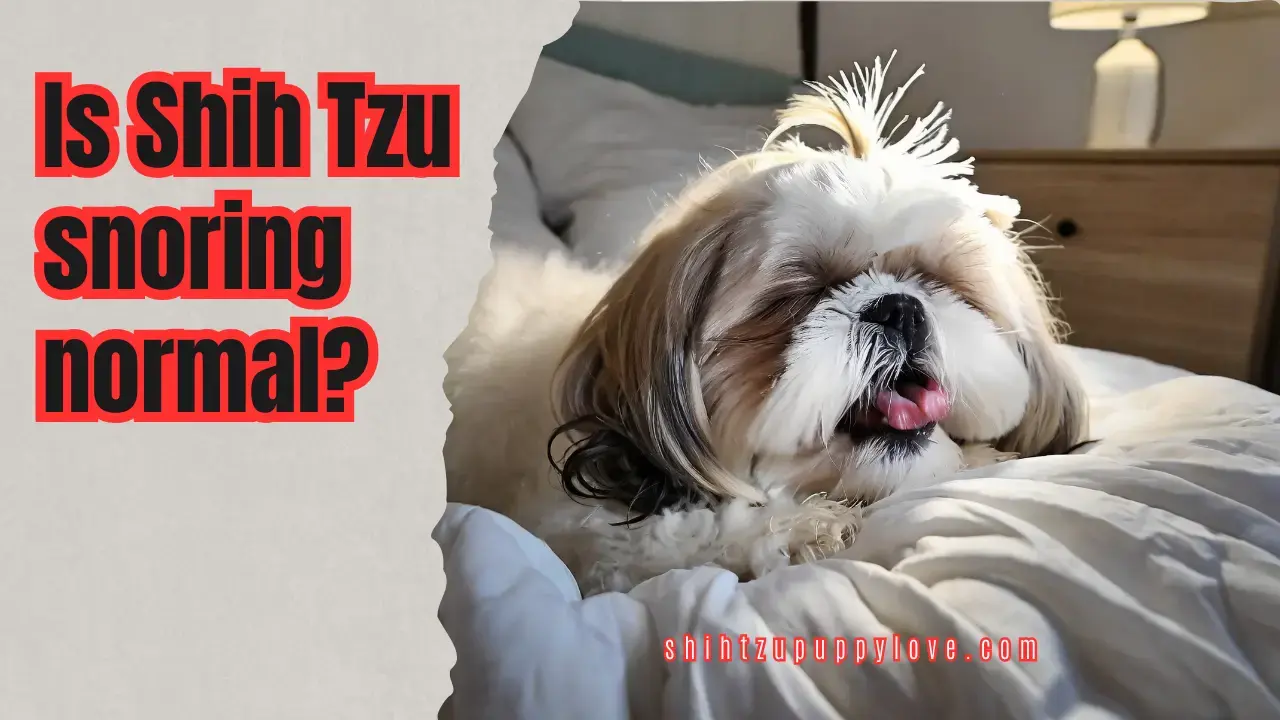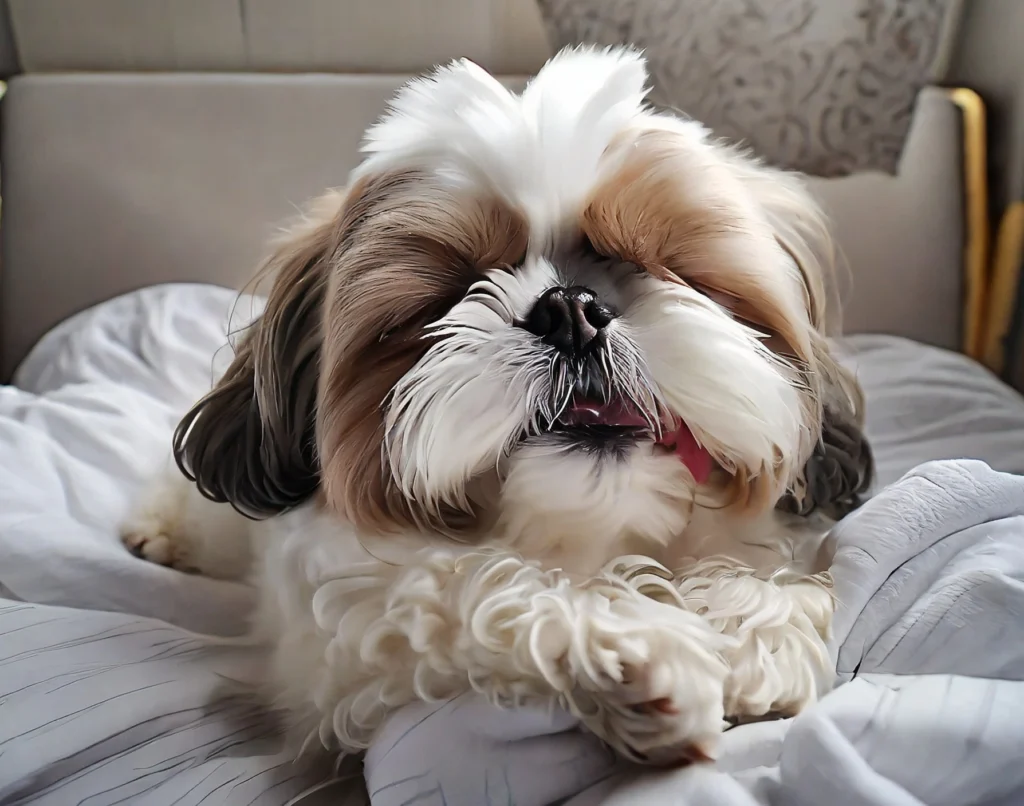Is Shih Tzu snoring normal?
Does your adorable little Shih Tzu snore like a freight train during nap time? Although the snoring might initially seem cute, you might question if this is a regular feature of shih tzu sleep or a sign of impending breathing problems. Well, fear not! This blog post will dive deep into Shih Tzu snoring and uncover the truth behind those adorable snores. From understanding their unique brachycephalic breed anatomy, known to cause snoring in many dogs, to discussing possible causes and health implications, we won’t overlook any detail. So grab your cup of tea, and let’s delve into the world of dog sleep, focusing on our adorable snoring shih tzus!
The prevalence of snoring in dogs:
Like humans, our furry friends, especially the likely-to-snore breeds such as pugs and shih tzus, can also be avid snorers! It’s standard for dogs of all breeds, particularly overweight and brachycephalic, to let out the occasional snore while catching some Zs. However, when it concerns shih tzus, their cute little snores seem to take the limelight, making them known to snore more than others.
The prevalence of snoring in dog sleep varies and may be swayed by factors like breed age, whether they’re overweight, and overall health. While some dogs may enjoy peaceful, silent sleep, others – for instance, brachycephalic breeds – may serenade us with symphonies of snores throughout the night.
When it comes specifically to shih tzus, they have a reputation for being more prone to snoring than other breeds. This propensity for snoring is partly due to their distinct brachycephalic facial structure and anatomy, which can cause snoring. Shih tzus typically have shorter muzzles and flatter faces, characteristic of a brachycephalic breed, which can lead to airway restrictions and a greater likelihood of snoring.
It’s important to note that occasional or mild snoring in shih tzus is generally considered normal and nothing serious to worry about. The snoring adds to the list of quirky traits that make these brachycephalic breeds progressively endearing! However, if your furry friend starts exhibiting excessive or loud snoring consistently throughout sleep – it might be worth delving deeper into the potential causes behind this pattern.
Next, we’ll delve into the intriguing world of anatomic peculiarities that make shih tzu noses unique, specifically as a brachycephalic breed, and examine how these factors can cause snoring and affect their breathing patterns. So keep reading as we unravel the mysteries behind these adorable flat faces known to snore!
Understanding the anatomy of a Shih Tzus airway:
The anatomy of a Shih Tzu’s airway, uniquely designed for brachycephalic breeds, plays a pivotal role in understanding why they are more likely to snore. These adorable little dogs have unique features that can contribute to their potential for snoring.
One crucial factor is their brachycephalic skull shape, which means they have a short and flat muzzle. This characteristic often leads to narrower nasal passages and an elongated soft palate, obstructing airflow during sleep.
The structure of the Shih Tzu’s throat can also contribute to snoring. They may have excess tissue or loose muscles around their airway, which can vibrate when they breathe in and out during sleep.
It’s worth noting that not all Shih Tzus will experience snoring due to these anatomical factors. Genetics, weight, allergies, and other health conditions can also play a role.
Understanding the unique anatomy of your Shih Tzu’s airway is crucial in managing their snoring. By recognizing these specific characteristics, you can take proactive steps to help alleviate any discomfort or breathing difficulties your furry friend may experience during sleep.
Possible Causes of Snoring in Shih Tzus:
Snoring is common among many dog breeds, including the adorable and affectionate shih tzus. While occasional snoring may be harmless, persistent snoring can indicate underlying issues that need attention.
One possible cause of snoring in shih tzus is their unique anatomy. These small dogs have short muzzles and flat faces, which can lead to narrower airways. This structural difference can result in turbulent airflow during breathing, leading to the characteristic snorting or wheezing sounds.
Another factor contributing to snoring in shih tzus is obesity. Like humans, excess weight can pressure the airway passages and obstruct smooth airflow. If your furry friend has packed on a few extra pounds, it might be time for some portion control and regular exercise.
Allergies are also known culprits behind canine snores. Shih Tzus are prone to allergies triggered by dust mites, pollen, or certain foods. These allergens can cause nasal passages or throat inflammation, resulting in noisy breathing while asleep.
Brachycephalic syndrome – a condition common among flat-faced breeds – could be responsible for your shih tzu’s snoring episodes. This syndrome encompasses respiratory abnormalities such as narrow nostrils or an elongated soft palate that interfere with standard breathing patterns.
Understanding these potential causes of snoring will help you identify why your beloved Shih Tzu may be experiencing this nighttime symphony of sounds. Remember to consult your veterinarian if you’re concerned about your pet’s health or if their snoring becomes excessively loud or disruptive during sleep.
Health implications of persistent snoring:
Persistent snoring in Shih Tzus may seem harmless and cute, but it can have some health implications that shouldn’t be overlooked. While occasional snoring is regular for dogs, if your Shih Tzu snores consistently and loudly, it could indicate an underlying issue.
One potential consequence of persistent snoring is poor sleep quality. Just like humans, dogs need uninterrupted sleep to rest and recharge. A dog who snores heavily may experience frequent awakenings throughout the night, leading to daytime fatigue and irritability.
Snoring can also be indicative of respiratory problems in Shih Tzus. The breed’s flat face and short muzzle make them more prone to airway obstruction or narrowing, which can restrict their ability to breathe correctly during sleep. This can lead to strained breathing patterns, increased effort to draw in air, and decreased oxygen intake.
Furthermore, chronic snoring in Shih Tzus has been associated with other health issues, such as obesity and heart disease. Excess body weight puts additional pressure on the airways, making it more difficult for a dog to breathe normally while sleeping. Additionally, persistent snoring has been linked to an increased risk of developing cardiovascular problems over time.
Pet owners need to monitor their Shih Tzu’s snoring habits closely. If you notice any changes or worsening symptoms, such as excessive loudness or gasping sounds during sleep, it may be wise to consult a veterinarian for further evaluation. They will be able to assess your dog’s overall health and determine whether any underlying conditions are contributing to the snoring.
How to manage and reduce snoring in shih tzus:
Don’t worry if your adorable Shih Tzu keeps you up at night with their snoring; don’t worry! There are ways to manage and reduce their snoring so both you and your furry friend can get a good night’s sleep.
First, it’s essential to understand that snoring in shih tzus is usually caused by the structure of their airway. Their short nose and flat face can lead to narrowed nasal passages, making it harder for them to breathe correctly. This can result in the vibrations that create those unmistakable snoring sounds.
Consider changing your sleeping environment to help manage your Shih Tzus snoring. Ensure they have a comfortable bed with proper support for their neck and head. Elevating their head slightly using pillows or a raised dog bed may also help improve airflow while they sleep.
Maintaining a healthy weight is also crucial since obesity can exacerbate breathing difficulties in dogs. Encourage regular exercise and provide a balanced diet tailored to their nutritional needs.
Another effective way to manage snoring in shih tzus is by keeping allergens under control. Dust mites, pollen, and other common allergens can irritate your dog’s airways, leading to increased congestion and potential snorting or wheezing during sleep. Regularly cleaning your home, washing bedding frequently, and using air purifiers can reduce these irritants.
It might be worth considering investing in a humidifier as well. Dry air worsens respiratory issues like congestion or airway inflammation, which could contribute to excessive snoring in shih tzus.
While managing snoring at home is possible for most cases of simple obstruction due to anatomy, there are instances where excessive loud, persistent, heavy breathing should not be ignored – this includes symptoms such as choking episodes during sleep or difficulty breathing when awake even after trying the abovementioned methods. In such situations, seeking veterinary care would be the best course of action to ensure no underlying health conditions are causing or
When to seek veterinary care for excessive snoring:
When it comes to snoring in Shih Tzus, occasional or mild snoring is generally considered normal. However, excessive snoring can cause concern and may indicate an underlying health issue. So, when should you seek veterinary care for your Shih Tzus excessive snoring?
If your Shih Tzu’s snoring suddenly becomes louder or more frequent than usual, it could signify something more serious. Additionally, suppose your dog displays other symptoms such as difficulty breathing, coughing, wheezing, changes in behavior or appetite, and excessive snoring. In that case, it is essential to consult with a veterinarian.
Excessive snoring can be caused by various factors, including obesity, allergies, respiratory infections or blockages (such as enlarged tonsils), dental problems, or certain medications. A veterinarian can determine the underlying cause through a thorough examination and may recommend further tests such as X-rays or blood work if necessary.
Early intervention is critical in addressing any potential health issues in your beloved companion. Seeking veterinary care for excessive snoring ensures that any underlying conditions are identified and treated promptly.
Remember that each dog is unique, and what might seem like excessive snoring for one Shih Tzu may not be the same for another. It’s always better to err on the side of caution and consult with a vet if you have any concerns about your pet’s health.
FAQ: Is Shih Tzu Snoring Normal?
1. Why does my Shih Tzu snore loudly at times?
Like many other dog breeds, Shih Tzus may snore for various reasons. One common cause is the breed’s brachycephalic (short-nosed) facial structure, which can lead to airway obstruction during sleep. Additionally, factors such as obesity, allergies, or respiratory issues can contribute to loud snoring in Shih Tzus.
2. Should I be concerned if my Shih Tzu snores consistently?
Consistent snoring in Shih Tzus may indicate an underlying health issue that requires attention. While occasional snoring is regular, persistent and loud snoring could indicate respiratory problems, sleep apnea, or obesity. It is advisable to consult with a veterinarian to rule out any potential health issues.
3. Can I do anything to reduce my Shih Tzu’s snoring?
Yes, there are steps you can take to help alleviate your Shih Tzu’s snoring. Maintaining a healthy weight through proper diet and regular exercise is crucial. Providing a comfortable sleeping environment, free from allergens and using elevated beds can promote better breathing. Also, consulting a veterinarian for professional advice on managing snoring is advisable.
Maintain a healthy weight for your Shih Tzu through proper diet and exercise.
Create a comfortable, allergen-free sleeping environment.
Elevated beds can aid in promoting better breathing during sleep.
4. Is snoring more common in older Shih Tzus?
Yes, snoring can become more common in older Shih Tzus. As dogs age, their muscles and tissues may lose tone, leading to an increased likelihood of airway obstruction during sleep. While age-related snoring is often benign, any sudden changes in snoring patterns or the onset of other symptoms should prompt a visit to the veterinarian for a thorough examination.
Snoring can become more prevalent in older Shih Tzus due to aging.
Age-related snoring is typically benign but should be monitored.
Sudden changes in snoring patterns warrant a visit to the veterinarian.
5. Are there specific breeds more prone to snoring than Shih Tzus?
Certain dog breeds are more prone to snoring due to their unique facial structures. Brachycephalic breeds, such as Bulldogs, Pugs, and French Bulldogs, are known for their increased likelihood of snoring. While Shih Tzus are also brachycephalic, the severity of snoring can vary between individual dogs.
Brachycephalic breeds like Bulldogs and Pugs are more prone to snoring.
The severity of snoring can vary among individual Shih Tzus.
Understanding breed characteristics can help manage and address snoring issues.

















Post Comment